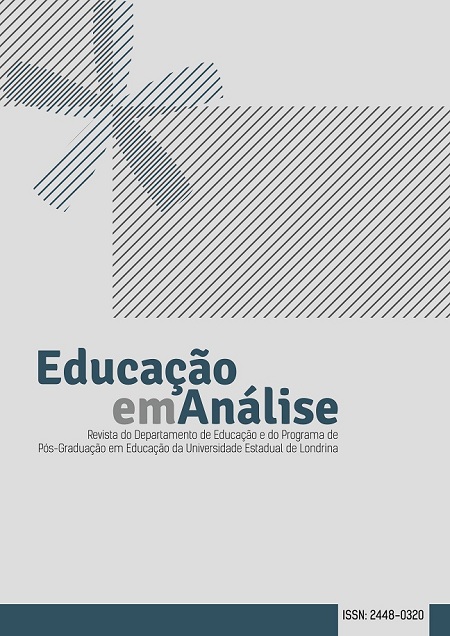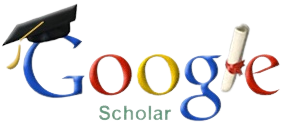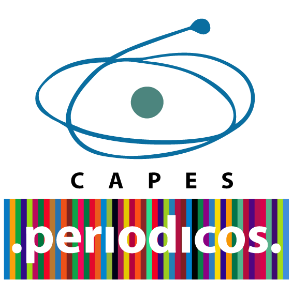John Dewey: ideas to think about the teaching of philosophy and its
DOI:
https://doi.org/10.5433/1984-7939.2020v5n2p241Keywords:
John Dewey, Philosophy, Teaching of philosophy, Senses of the teaching of philosophyAbstract
The article defends the inclusion of philosophy as a teaching and learning space in educational institutions. It starts from recognizing the need to philosophically approach the question for its teaching and reconstruct the sense in which we understand it as a previous step to its defense. In this framework, the discussion of a teaching centered on philosophy as a course, or on the philosophical tradition is retaken as a classic debate on the didactics of philosophy. As a central contribution, we investigate John Dewey's conception of philosophy and the reasons for the study of this course, which represents an overcoming of the traditional dabte between Philosophy-philosophize. The author claims philosophy as "philosophizing", although he assumes the study of the philosophical tradition as necessary to emancipate ourselves from ideas and prejudices that we have incorporated without recognizing them as such. At the same time, it defends the study of tradition as a set of ideas that should be put into dialogue with the present and, thus, they are tools for thinking about current affairs. Finally, the article raises the subject's own curiosity, the feeling of wonder at the universe and its enigmas, as another great motivating reason for the study of philosophy.Downloads
References
CERLETTI, A. La enseñanza de la filosofía como problema filosófico. Buenos Aires: Del Zorzal, 2008.
DEWEY, J. La reconstrucción de la filosofía. Buenos Aires: Aguilar, 1964.
DEWEY, J. El niño y el programa escolar: mi credo pedagógico. Buenos Aires: Losada, 1967.
DEWEY, J. Why study philosophy? En: DEWEY, J. The early works, 1882-1898. London: Carbondale and Edwardsville; Amsterdam: Souththern Illinois University Press: Feffer & Simmons, 1971. v. 4, p. 62-65
DEWEY, J. Experiencia y educación. Madrid: Biblioteca Nueva, 2004a. DEWEY, J. Democracia y educación. Madrid: Morata, 2004b.
GADAMER, H. G. Verdad y método II. Salamanca: Ediciones Sígueme, 1996.
JACKSON, P. John Dewey y la tarea del filósofo. Buenos Aires: Amorrortu, 2004.
KANT, I. Sobre el saber filosófico. Madrid: Adán, 1943.
KANT, I. Crítica de la razón pura. Buenos Aires: Losada, 1973.
NUSSBAUM, M. Sin fines de lucro: por qué la democracia necesita de las humanidades. Buenos Aires: Katz Editores, 2010.
OBIOLS, G. Una introducción a la enseñanza de la filosofía. Buenos Aires: Del Zorzal, 2008.
HENNING, L. M. P. Dewey e a filosofia. En: VELASCO, P. del N. (org.). Ensino de? qual? filosofia: ensaios a contrapelo. Marilia: Editora UNESP, 2019. p. 205-224.
RANOVSKY, A. Filosofía del docente filósofo. Buenos Aires: Colisión, 2011.
SANCHEZ MECA, D. La historia de la filosofía como hermenéutica. Madrid: Universidad Nacional de Educación a Distancia, 1996
Downloads
Published
How to Cite
Issue
Section
License
Copyright (c) 2020 Educação em Análise

This work is licensed under a Creative Commons Attribution 4.0 International License.
Os artigos publicados na Revista Educação em Análise estão sob a Licença Creative Commons Atribuição 4.0 Internacional, garantindo Acesso Aberto. Deste modo, os autores mantêm os direitos autorais de seus trabalhos e, em caso de republicação, solicita-se que indiquem a primeira publicação nesta revista. Essa licença permite que qualquer pessoa leia, baixe, copie e compartilhe o conteúdo, desde que a devida citação seja feita. Além disso, autoriza a redistribuição, adaptação e criação de obras derivadas em qualquer formato ou meio, incluindo uso comercial, desde que a atribuição à revista seja mantida.
A revista se reserva o direito de efetuar, nos originais, alterações de ordem normativa, ortográfica e gramatical, com vistas a manter o padrão culto da língua e a credibilidade do veículo. Respeitará, no entanto, o estilo de escrever dos autores. Alterações, correções ou sugestões de ordem conceitual serão encaminhadas aos autores, quando necessário.
As opiniões emitidas pelos autores dos artigos são de sua exclusiva responsabilidade.
























